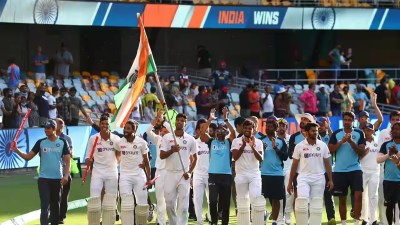Gained in transit
The smooth return of George W. Bush to the White House in the face of an Al-Jazeera telecast renewing Osama bin Laden8217;s threat of furth...

The smooth return of George W. Bush to the White House in the face of an Al-Jazeera telecast renewing Osama bin Laden8217;s threat of further attacks on the US will probably weaken the focus on the debatable issues of intelligence raised on 9/11 as also on the Iraq war by official probes in the US and UK. The published findings, however, offer an opportunity to other countries to evaluate their own systems.
The security system in a democracy is built around an 8220;intelligence road map8221; which has three well-defined components. National security assessments rest on a core of information of intelligence value which comes from professional agencies of the state. The intelligence agencies constitute the first part of this road map. Intelligence defines the nature as well as the timeframe of the threat and is therefore crucial to the formulation of response. In today8217;s complex world, intelligence comes from a multiplicity of agencies spread across various wings of government as also from some other sources of the state. All these pieces of the jigsaw have to be made available to security analysts at the national apex who constitute the second component and whose job it is to prepare final assessments and project strategy options. In the third segment is the political leadership that exercises sovereign power and decides, after due deliberation, the nation8217;s response to a threat.
The first segment deals with intelligence 8220;producers8221;. The second and third belong to the 8220;consumers8221;. A security failure can result from the failure of 8220;intelligence8221;, 8220;analysis8221; or 8220;action8221;. In the context of the US offensive in Iraq, it can be said that the international community is prepared to grant legitimacy to a 8220;preemptive8221; war only if there is adequate intelligence to firmly establish that such a war is in response to a definite plan of the adversary to launch an attack. Intelligence thus is a crucial determinant of war and peace and is under much sharper global scrutiny in today8217;s world.
Intelligence is a discipline that works on definite precepts which can be disregarded by the system at its peril. In inquiry reports of the US and UK a few points can be flagged to examine how the security infrastructure performed there and how our own arrangements work in relative terms.
The Independent 9/11 Commission raised the question of quality of intelligence. It said that in the US there was excessive reliance on technical intelligence somewhat to the neglect of human intelligence. This could partly be due to difficulties in penetrating target organisations and areas in the context of the 8220;War on Terror8221;. Intelligence is all about human activity and technology is pressed into use essentially to decipher what human beings are up to. It is a matter of satisfaction that the Indian system while striving to upgrade technology gives prime importance to human intelligence. Complete intelligence is difficult to come by and hence two things become crucial: no part of intelligence should be lost in transit, and the 8220;consumers8221; should be appropriately 8220;proactive8221; about information furnished to them. In the US, the case of the famous August 6, 2001 memo that came in for examination by the principals shows that no intelligence product should be dismissively treated. In India, the Kargil Review Committee listed intelligence inputs that failed to reach analysts at the top. Special attention is required to be given to the rules and procedures prescribed for communicating intelligence.
The probe committees were fairly explicit in commenting on intelligence analysis. The biggest pitfall of intelligence analysis is for it to get influenced by the prejudice or bias of policy makers. The commission said the analysts fell victim to 8220;group think8221; assumptions and made analytical judgements 8220;not supported by the underlying intelligence8221;. Psychologists have a theory that a group might make a decision based on the desire for unanimity rather than 8220;on the quality of the choice8221;. A professionally developed system minimises chances of this happening. The Indian system does not have a weakness of this kind but our machinery for analysis and assessment needs to be substantially upgraded.
Perhaps the commission8217;s most important comment is on a malady that afflicts most security systems 8212; disregard of the key precept that national security does not admit of a divided turf. Reference has been made to the complete compartmentalisation between the external dimensions of security and threats to internal or domestic security. A system not integrating the two does not do justice to its responsibility. 9/11 was an attack on the internal security of the US but its origins lay outside the country. It is said legal and structural impediments came in the way of full exchange of intelligence between the CIA and FBI. Fortunately in India chiefs of the agencies can be called for joint discussions in appropriate cases as our system does not stand on too much formality. Nonetheless, the highly professional function of coordinating the working of intelligence agencies needs to be put in place.
The institution of National Security Advisor is concerned with all three segments of the intelligence road map. He provides oversight to the intelligence community, monitors the performance of the analysis organisation serving the National Security Council, and provides valuable input in the formulation of strategic responses 8212; domestic and external. He has a turf of his own. Strategic internal and foreign policies are essentially products of national security and economic concerns. The NSA helps to frame them but their conduct is in the hands of the respective ministers. The US commission has recommended the appointment of a national director of intelligence. We can evolve an acceptable system of our own for intelligence coordination. A cost effective method could be to establish a national intelligence board under the NSA comprising the chiefs of premier intelligence agencies and one or two need-based invitees. The agencies can remain fully autonomous and the board, with a veteran professional as convener, could help primarily to keep the focus on threats, identify gaps and ensure fail-safe sharing of information.
The writer is a former director, Intelligence Bureau
- 01
- 02
- 03
- 04
- 05































